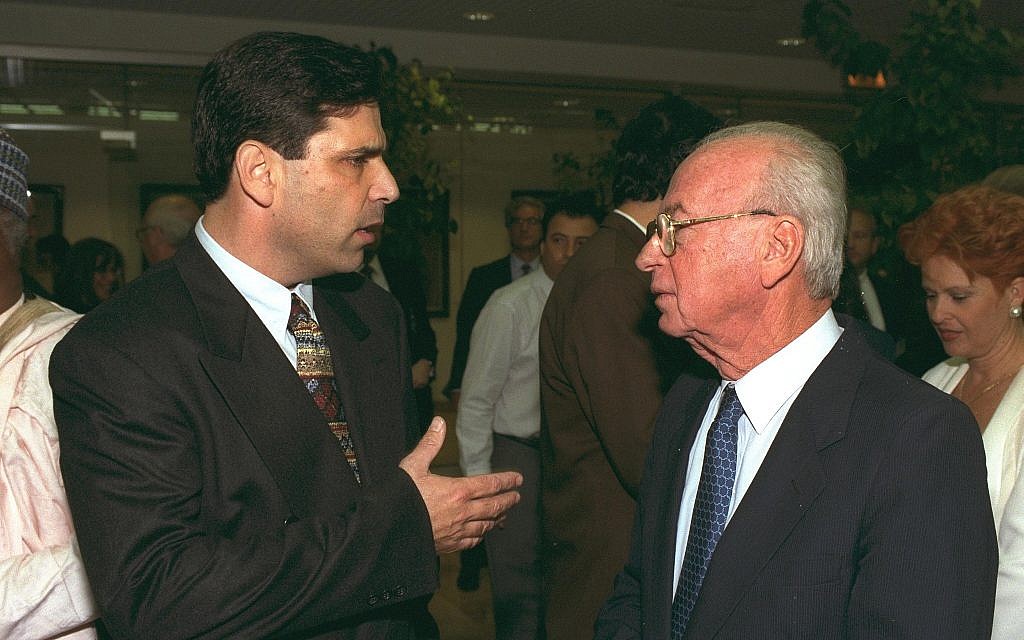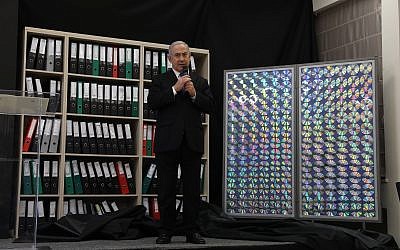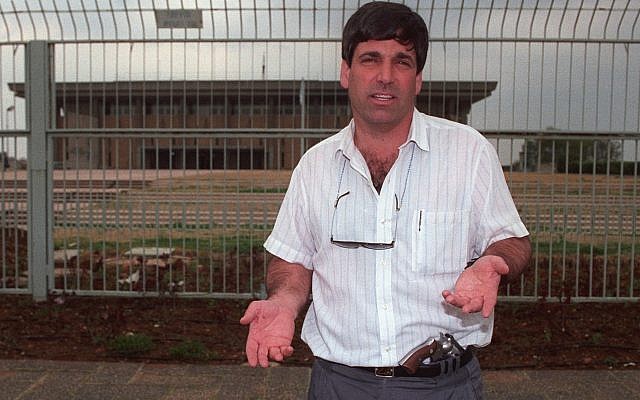Ex-minister likely a spy who knew too little, but Iran still got an intel coup
Any info Gonen Segev may have given Iran would have been outdated, but recruitment of a former cabinet member is major win for Israel's arch-foe, ex-national security adviser says.
The bombshell announcement by the Shin Bet security service on Monday that disgraced former minister Gonen Segev was indicted for spying on Iran’s behalf over the past six years is without precedent in Israeli history.
Over the years, IDF officers, Mossad agents, top scientists, and even a former Knesset member have been suspected or convicted of providing intelligence to Israel’s arch-foe Iran or its proxies, some of it likely more damaging to Israeli national security than whatever information Segev allegedly handed over. But never before has an Israeli official of such a high level been accused of working for the enemy.

This is one of the worst espionage cases in Israel’s history,” Chuck Freilich, former deputy head of the National Security Council, said on Monday.
Segev denied to investigators that he was working out of ideological or financial motivation, and said he was instead trying to act as a double-agent and spy on the Iranians, but the Shin Bet is unconvinced, Hebrew news reports indicated late Monday.
Who would have thought of going after a former cabinet minister?
Many aspects of the case remained under gag order, notably the specific types of information that Segev provided his Iranian handlers. “We cannot provide details about the information in question, only that information was provided,” the Shin Bet said.
Without that, it is difficult to say with certainty how much harm the intelligence allegedly provided by Segev could have caused, though it is likely limited, given the length of time that has passed since he served in government.
Segev’s role as minister of energy and infrastructure from early 1995 to mid 1996 would have given him deep knowledge about Israel’s energy grid and other national projects, including its oil refineries — but not Israel’s nuclear research center in Dimona, which is under the purview of the Prime Minister’s Office.
The information that Segev had access to would be valuable, for instance, if Iran planned to conduct cyber attacks on Israeli infrastructure. However, given that more than 20 years have passed since he held the position, much of this information is likely to have been outdated and therefore less useful.

Oil refineries towers in the northenr port city of Haifa on October 16, 2006. (Yossi Zamir/Flash90)
“I would guess there’s very little that’s still relevant,” Freilich said by phone.
The former deputy national security adviser said Segev would likely not have access to specific information about current Israeli infrastructure or national security issues, but could still have provided Iranian intelligence with details about more general Israeli “methods and approaches” — how the security services and government operate.
According to the charges against him, Segev is also suspected of connecting his handlers, whom he presented as businessmen, with unwitting Israeli officials, from whom the Iranians could glean more up-to-date information.
But more so than the actual intelligence that Iran could get from Segev, the mere fact that Israel’s long-time enemy could allegedly recruit a former cabinet minister is in itself a major victory for the Islamic Republic’s clandestine services.
“It’s quite a coup for the Iranians,” Freilich said.

Prime Minister Benjamin Netanyahu gives a speech on files obtained by Israel he says proves Iran lied about its nuclear program, at the Defense Ministry in Tel Aviv, on April 30, 2018. (Miriam Alster/Flash90)
The former deputy national security adviser noted that the timing of this announcement also slightly detracts from Israel’s recent intelligence victory over Tehran — the Mossad’s stunning operation to smuggle a massive trove of documents about Iran’s out of the country and into Israel, which Netanyahu revealed to the world the month before Segev was arrested.
“It’s a counter to our achievement,” Freilich said.
Indeed, news outlets affiliated with Iran and its proxies quickly began gloating about the case.
“Segev’s actions were more dangerous than Mordechai Vanunu’s” — who revealed classified information about Israel’s once-secret nuclear program — “[Segev] participated in government meetings, and this is a huge achievement for Iran,” wrote the Hezbollah-connected al-Mayadeen news site, citing unnamed Israeli sources.
Iranians on social media also began mocking Israel with the hashtag #FreeGonenSegev.
Not only could Segev’s alleged recruitment be seen as a win for Iran, but it would also be a loss for Israel’s security services, who failed to prevent it or catch it more quickly — though this is somewhat offset by the fact that Segev was eventually arrested.
“This is both a horrible failure for [the Shin Bet] that this happened, but it’s also quite a coup for them that they caught the guy,” Freilich said.
“Who would have thought of going after a former cabinet minister?”

Then-MK Gonen Segev seen outside the Knesset on March 15, 1993. (Flash90)
Segev, who trained as a medical doctor, was elected to the Knesset in 1992, at the age of 35, as part of Raful Eitan’s now defunct Tzomet party.
He famously split from that party in 1994 and set up the short-lived Yiud faction along with two other Tzomet MKs. His vote was critical in passing the Oslo II Accords in the Knesset in 2015, by which time he was a government minister.
From 1995 to 1996, under former prime ministers Yitzhak Rabin and Shimon Peres, Segev headed the Energy and Infrastructure Ministry (now known as the Ministry of National Infrastructure, Energy, and Water Resources), before quitting politics when he lost his seat in the 1996 elections.
According to the Shin Bet, Segev first made contact with Iranian officials in 2012, meeting them in the Islamic Republic’s embassy in Nigeria, where he has lived since leaving Israel in disgrace after a stint in prison for trying to smuggle ecstasy into Israel from the Netherlands.
In addition to his meetings in Nigeria, Segev is also suspected of traveling to Iran twice and meeting his handlers in hotels and safe houses around the world.
According to the Shin Bet, the disgraced former minister did this “in full knowledge that they were Iranian intelligence operatives.”
On Friday, he was indicted in a Jerusalem court on charges of assisting the enemy in wartime, spying, and a number of other related crimes, but the case remained under a gag order until Monday.
In a statement, Segev’s lawyers said the full charge sheet painted a “different picture” from that which can be seen only from the parts that were cleared for publication.
Segev was reportedly being held in a secret Shin Bet facility, but was slated to be moved to prison later this week.
https://www.timesofisrael.com/ex-minister-said-to-have-maintained-contacts-with-embassy-while-allegedly-spying/
https://www.timesofisrael.com/ex-minister-likely-spy-who-knew-too-little-but-iran-still-got-an-intel-coup/?utm_source=The+Times+of+Israel+Daily+Edition&utm_campaign=da5eef12e0-EMAIL_CAMPAIGN_2018_06_19_10_13&utm_medium=email&utm_term=0_adb46cec92-da5eef12e0-55994765
























.jpg)




















































.jpg)

Inga kommentarer:
Skicka en kommentar